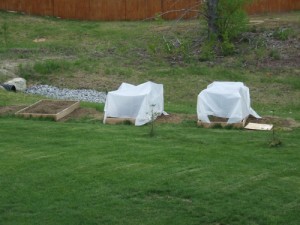Protecting Vegetable Gardens From Frost


Protecting Vegetable Plants From Frost


Tonight’s forecast is for 28° F which is certainly cold enough for a very deep frost. This is bad news for our tomato and pepper plants that we planted last weekend. After growing up with large vegetable gardens as a kid I know just how to beat this cold blast from Mother Nature.
Cover Vegetable Plants With Plastic
In order to protect your new vegetable plants from the dangers of frost you need to understand how frost works. Frost typically forms on cold clear calm nights. It almost always happens in open areas without cover from trees and structures.
There are several ways of protecting your plants from frost. Some folks like to spray plants with water in the evening before a frost. The theory is the water will freeze on the leaves instead of freezing the cell structure (not sure I’m comfortable with this approach). Probably the most popular method is covering the plants. You can cover the plants with plastic or cloth materials like sheets and burlap. Some say that if you use plastic you may trap too much moisture in the enclosure thus risking even worse frost damage (I’ve never had this problem).
I like to create a tent with the plastic. I installed some wood stakes around our new raised bed gardens to keep the plastic from touching the plants directly. I made sure the enclosure was not completely closed off so plenty of air can move through the “structure”. This method helps keep some of the warmth in from the soil and it keeps the really cold air from forming ice particles on top of the tender new plants. With any luck our plants will now survive the cold night.
How do you protect your plants from frost?
Recent Posts
Framing Stick Nailer vs Coil Nailer
Which is Better a Stick Nailer or Coil Nailer? Framers have many choices in nailers…
How Many Roofing Nails Per Square of Shingles
Estimating How Many Nails for a New Roof When it comes to estimating materials for…
Composite / PVC Decking – Layout Tips & Advice
Composite / PVC Decking Layout Tips and Advice Composite and PVC decking have really changed…
Benefits of an ERV System (Energy Recovery Ventilator)
Benefits of ERV Systems (Energy Recovery Ventilator) If you're building a new home or doing…
Vermiculite Attic Insulation Abatement
Vermiculite Attic Insulation If your home was built before 1990 there is a chance it…
Nuisance Tripping of AFCI (Arc Fault) Circuit Breakers
Arc Fault (AFCI) Circuit Breakers Tripping Often An arc-fault circuit interrupter (AFCI) or arc-fault detection…
View Comments
This is a great solution because the plastic can keep the air inside up to 15 20 degrees warmer than the air outside. I really helps to save these new young plantings.
@ Baba - Well the idea was great...unfortunately temps got down to 24 deg. last night and the tomatoes were damaged badly. Plastic works great for a mild frost but last nights weather was just too cold. Back to the store for more plants! UGH
My garden died this summer in San Leon, Texas. Our soil was destroyed in Hurricane Ike. I put in three raised beds.
We may get snow tomorrow and down to 29 tomorrow night.
I spent the late afternoon putting plastic over my garden. I had one large piece that
I covered the middle one, with all my green tomatoes, zucchini and egg plant in the flowering stage, basil going crazy and okra coming in daily, bell peppers all over the place.
One of the outer beds I covered each plant with its own plastic bag. I raided my grocery bags that I roll into a small ball for use as needed. I don't think it will freeze enough to stick! I hope!
My other outside bed is in tires. I started to bag them and realized they were just to big, even for the brawny kitchen bags.
I covered what I could, then I pulled some tires my husband had cut the rims away that I was saving for Spring. I added tires to cover the plant. Some took four! The Asperagus only took two because I cut it back last month. The Basil on the corner took 5!
Wish me luck.